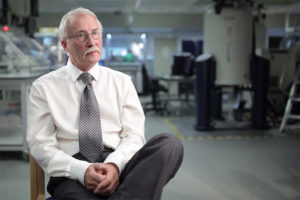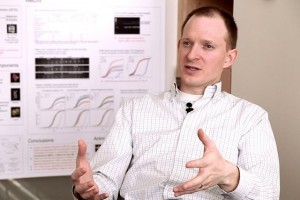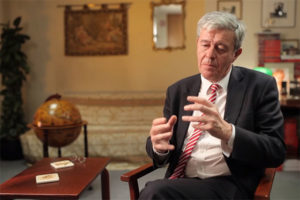Molecular Toxicology
Biochemist Ian Wilson on toxicity of paracetamol, clinical trials, and safe drugs
When you wake up in the morning and look in the mirror, you probably think of yourself as an individual, and in many ways you are, but you’re actually home to a vast number of other organisms. The microbiome I’m going to talk about is the gut microbiome. In adults this can weigh up to a kilogram, which is quite a lot of microbiota really. In some people it is actually bigger than their brains.
Before you start worrying about how you’re going to get rid of this unwanted stuff, you should understand that it is really quite important. The example I would use is these microorganisms are not passengers in your gut, they’re actually crew, and you get a lot of benefit from having them. In fact you’re more like a rainforest – you have a complex ecology that starts in your mouth and works all the way down to the GI tract, with a huge concentration of bacteria in your colon. They’re all doing useful stuff for you or at least most of them are.
If you think about the number of genes that human beings have – twenty to thirty thousand, and the number keeps changing, all seem to be going down, which seems to worry people, because they think they should be more impressive than that. You have about ten trillion cells in your body. A microbiome is maybe a hundred trillion cells. They each have a genome. Actually you’re probably only about 10% human, if you think about their genomic contributions to your well being.
They also produce trace things like vitamins, they’re responsible for about a significant amount of calorific recovery from fermentation in your lower bowel, but things like proteins or complex polysaccharides that are simply not digested by your own enzymes. So, without this gut microbiota you’d be a very different and less interesting individual, and quite unhealthy too.
One of the things that the microbiome also does is it modulates the effects of certain drugs. There are some drugs where metabolism and their efficacy are actually dependent on enzymes in the gut microbiome converting the drug into its active form. When you take these drugs, things like sulfasalazine and similar drugs for things like irritable bowel disease, the efficacy of the drug depends on there being microbiota in the gut that can reduce these molecules and convert them to the active form.
An example of one of the things that the microbiota do for you: if you drink coffee, it contains something called caffeic acid, which is a bit of a coincidence really. If you think about it as the caffeic acid goes down through your guts, it’s not particularly useful to you, but the gut microflora extract energy from it, and eventually they convert it into something, which is absorbed into your liver, which your liver metabolizes a little bit and then excretes back into the gut, where more bacteria do more things to that. Eventually you end up with a molecule called benzoic acid, which your liver conjugates with a minor acid called glycine, and that gets excreted in the urine. One of the things that you do for your gut microbiota is you waste disposal system for them, which is again another reason for that’s not being too pompous about being pinnacle of life.
Your microbiome is quite important to you. One of the things therefore we should be thinking very carefully about is looking after the microbiome. If you take large doses of antibiotics, they will potentially kill species of your gut, species and bacteria in your gut that you actually want to keep. So, we’re conducting a huge experiment on the microbiome, which we didn’t even know we were taking on.
One of the things that the microbiome does for you by fermenting these things that would otherwise be waste products is reducing things like short-chain fatty acids. That provides you, firstly, with a significant calorific recovery. You get more from your food than you would have done otherwise. They’re paying, if you like, for being in your gut. Secondly, these short-chain fatty acids seem to have beneficial effects in preventing or slowing down the development of bowel cancer. You’re in a symbiotic relationship with your gut microflora, and that’s essentially a very good thing.
Occasionally, this symbiotic relationship is less useful than it might be. There is a range of drugs – nonsteroidal anti-inflammatories – which are excreted in the bile as glucuronidase. If this is ibuprofen or diclofenac, it has a carboxylic acid moiety on it, and your body sticks on the glucuronic acid, and that enables it to be easily excreted in the bile. The problem is when it’s excreted in the bile and ends up in the colon. There’s a whole range of bacteria there, who don’t see the drug, but they do see the glucuronic acid. So, they have enzymes that are specifically designed to remove glucuronic acid, they then use as fuel liberating the diclofenac.
Diclofenac itself is a gut toxin, so as the glucuronide it’s perfectly safe, but it’s inactivated. The gut microflora have by accident turned it into a bomb. So, you get ulceration, if you have toxic doses. Some scientists in the US spotted this and came up with a really brilliant idea of blocking the bacterial enzyme. Humans also have glucuronide acides as well, but they’re different structure to the bacterial ones. He was able to make something which specifically blocked the hydrolysis by the bacterial enzyme was leaving the human one unaffected. That has the ability to stop this sort of problem.
One of the problems though is that it’s only because of recent advances in molecular biology that we’ve been able to realize how diverse and complex the microbiome is. We’re talking about an ecology that contains at least a thousand species. One of the questions you can ask is: can we improve the microbiome? As we don’t yet fully understand the ecology of the system, we don’t know what to improve.
One of the things that you can consider is what is the best microbiome of the optical microbiome? Should we be reengineering the microbiome? The problem is that we don’t yet really understand its full capabilities. There are at least 2,000 species of bacteria in the gut. If you start deciding that some are good and bad, and introducing others, you could get a similar sort of disastrous effect on the ecology, as introducing rabbits to Australia, which probably seem like a good idea at the time, but it’s one of those things that we would reverse, if you possibly could.
We are at the very early stages of understanding of microbiome and what’s going on in it, at the very early stages really of understanding how the microbiome interacts with drugs. We know that at least 30 or 40 drugs have a interrelationship with effects from the microbiome on them in terms of metabolism or disposition. There may be many others where we haven’t yet established. There’s a fantastic opportunity for science to delve into something completely unexplored, and it’s entirely within your own stomach, which I think is wonderful.

Biochemist Ian Wilson on toxicity of paracetamol, clinical trials, and safe drugs

MIT Research Scientist Christopher Carr on terrestrial Mars analogues, the importance of computer science in a...

Neuroscientist Karl Friston on the place of cognition in our body and outside it, the way we perceive objects,...